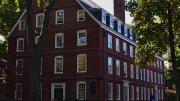Update, March 29, 2020: Harvard announced Friday that it would continue to provide pay and benefits to its direct employees, including those who work part-time, as well as to contract workers, through May 28. “We applaud Harvard for doing the right thing and implementing a leave policy that will allow both contracted and directly-employed workers to make ends meet during this unprecedented crisis," Roxana Rivera, vice president of 32BJ Service Employees International Union, said in a statement. "Having access to pay and healthcare benefits will give the 1,000 cleaners and security officers we represent at Harvard peace of mind knowing they can stay safe and healthy while continuing to feed their families. These workers have been at the frontlines of fighting this virus, keeping the campus clean and safe even as students are sent home, and we’re glad that Harvard is acknowledging their important service."
Last week, as the nation shut down due to the rapidly escalating COVID-19 pandemic and Harvard undergraduates evacuated their dorms for the semester, the University announced that it would provide 30 days’ paid leave to workers whose workplaces have closed, including Harvard University Dining Services (HUDS) employees who staff undergraduate dining halls. At the same time, a controversy has brewed across campus over what will happen to workers who are not directly employed by Harvard, but through subcontractors—a significant cohort, given the outsourcing of various services to security, dining, and other vendor enterprises. Though these employees formally work for third-party companies like Restaurant Associates and Securitas, they perform some of Harvard’s core work, including security services and staffing cafeterias at the professional schools.
The Boston Globe reported yesterday that MIT plans to pay its food-service workers, including subcontracted workers, through May 22. The situation is fluid; Harvard is expected to announce a decision by the end of this week about whether and how it can help subcontracted workers. “The University will continue to review and assess its human resources policies, including those related to compensation, as this public health crisis and its economic impact continue to evolve,” University spokesman Jason Newton said in a statement earlier this week.
“For those of us who lose hours, we have the option of using sick time, vacation time or ‘personal days,’ but that's the extent of compensation available,” Aryt Alasti, a security guard subcontracted through Securitas, wrote in an email Tuesday night. He added that his union, the Service Employees International Union, is working on “getting Harvard to provide guards with financial coverage for paid leave time equal to what direct employees receive.”
More than 6,500 people have signed a letter organized by the Labor and Employment Action Project, a Harvard Law School student group, urging Harvard to provide paid leave to subcontracted workers. “As Harvard shuts down operations to protect the public’s health, it must take steps to ensure that all University employees—including subcontracted and temporary employees—can support and care for themselves and their families during this global pandemic,” the letter states. “To that end, we were glad to see that the University will pay most directly-hired hourly employees who can no longer work on campus or remotely for at least 30 days, and we hope that the University will continue to pay all employees at full pay at least for the remainder of the spring semester.” It continues:
However, many workers are currently excluded from this policy. For instance, the University administration has refused to guarantee these 30 days of pay to subcontracted dining and catering workers at Harvard Medical School, Harvard Law School, and the Graduate School of Design, as well as at the Science Center’s Clover Cafe and the School of Education’s Rebecca's Cafe. Likewise, Harvard has so far refused to guarantee these 30 days of pay to subcontracted security guards and custodians. (Fortunately, security guards and custodians have clauses in their contracts requiring that pay be maintained during an emergency; Harvard must uphold these provisions during this pandemic.)
The letter refers to Harvard’s Wage & Benefit Parity Policy, which states that “the University seeks to ensure that contracted custodial, retail dining and security service workers at Harvard receive total compensation comparable to that offered to corresponding University employees.”
Inside Higher Education headlined an article on this issue as it arises on multiple campuses “The Staffing Divide.” It reported that Penn is paying directly employed service workers through the end of the semester, but that contract employees who work for a dining vendor will be laid off at the end of this month. At Stanford, the report continued, directly employed staff members have been guaranteed pay through April 15, but contracted janitors’ status is uncertain; a Stanford campus group, Students for Workers’ Rights, is advocating salary continuance for those contract workers.









